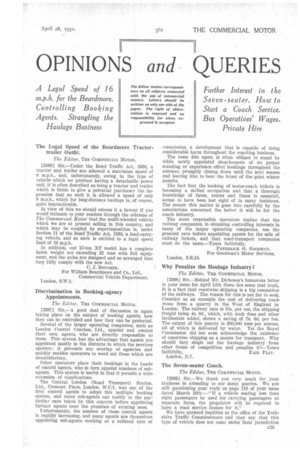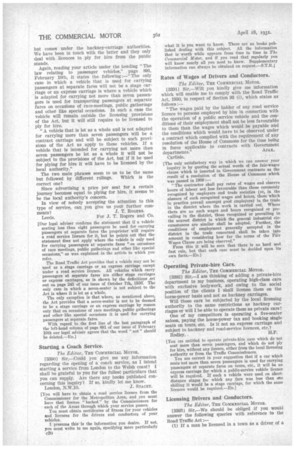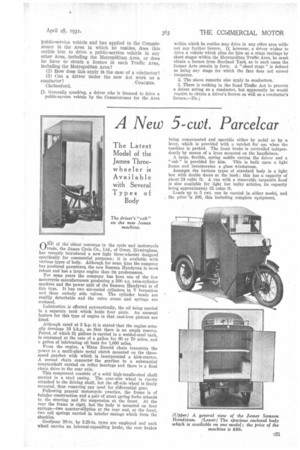OPINIONS and QUERIES The Legal Speed of the Beardmore Tractortrailer Outfit.
Page 51

Page 52

Page 53

If you've noticed an error in this article please click here to report it so we can fix it.
The Editor, THE COMMERCIAL MOTOR.
[3386] Sir,—Under the Road Traffic Act, 1930, a tractor and trailer are allowed a maximum speed of 8 m.p.h., and, unfortunately, owing to the type of vehicle which we produce having a detachable power unit, it is often described as being a tractor and trailer which is liable to give a potential purchaser the impression that as such it is allowed a speed of only 8 m.p.h., which for long-distance haulage is, of course, quite impracticable.
In view of this we should esteem it a favour if you would intimate to your readers through the columns of The Commercial Motor that the multi-wheeled vehicle which we are at present selling in this country, and which may be coupled by superimposition is, under Section 11 of the Road ,Traffic Act, 1930, a load-carrying vehicle, and as such is entitled to a legal speed limit of 16 m.p.h.
In addition, our 15-ton XT model has a complete laden weight not exceeding 22 tons with full equipment, and the axles are designed and so arranged that they fully comply with the new Act.
C. J. I3otteuxn.
For William Beardmore and Co., Ltd., Commercial Vehicle Department. London, S.W.1.
Discrimination in Booking-agency Appointments.
The Editor, THE COMMERCIAL MOTOR.
[3387] good deal of discussion is again taking place on the subject of booking agents, how they can be controlled and how they can be protected.
Several of the larger operating companies, such as London Coastal Coaches, Ltd., appoint and control their own agents, who are directly responsible to them. This system has the advantage that agents are appointed mostly in the districts in which the services operate; it prevents any overlap of agencies and quickly enables operators to weed out those which are unsatisfactory.
Other operators place their bookings in the hands of control agents, who in turn appoint numbers of subagents. This system is useful in that it permits a wide extension of ramifications.
The Central London (Road Transport) Station, Ltd., Crescent Place, London, W.C.1, was one of the first control agents to adopt this multiple booking system, and many sub-agents can testify to the particular care taken by this concern before appointing further agents near the premises of existing ones.
Unfortunately, the number of these control agents is rapidly increasing, and many agents are themselves appointing sub-agents working at a reduced rate of eonnnission, a development that is capable of doing considerable harm throughout the coaching business.
The bona fide agent is often obliged to stand by while newly appointed shop-keepers of no proper standing or experience effect bookings throughout the summer, promptly closing down until the next season find leaving him to bear the brunt of the quiet winter months.
The fact that tile booking of motor-coach tickets is becoming a skilled occupation and that a thorough knowledge of fares, routes and times is essential, seems to have been lost sight of In many instances. The sooner this matter is gone into carefully by the associations concerned the better it will be for the coach industry.
The more responsible operators realize that the railway companies, in obtaining controlling interests in many of the larger operating companies, use the greatest care before appointing agents for the sale of railway tickets, and that road-transport companies must do the same.—Yours faithfully,
FREDERICK G. GoonmA-K, For Goodman's Motor Services, London, S.E.18.
Why Penalize the Haulage Industry?
The Editor, THE COMMERCIAL MOTOR.
[3388] Sir,—Behind Mr. Dickeson's humorous letter in your issue for April 14th there lies some real truth. It is a fact that coastwise shipping is a big competitor of the railways. The reason for this is not far to seek. Consider as an example the cost of delivering road' stone from a quarry in the West of England to London. The railway rate is 15s. per ton, the shipping freight being 4s. 6d„ which,' with dock dues and other incidentals added, shows a saving of 7s. 6d. per ton. The output of this quarry is 300,000 tons per annum, all of which is delivered by water. Yet the Royal Commission did not even acknowledge the existence of coastwise shipping as a means for transport. Why should they single out the haulage industry from other forms of competition and penalize in—Yours
faithfully, FAIR PLAY. London, N.7.
The Seven-seater Coach.
The Editor, THE COMMERCIAL MOTOR.
[3389] Sir,--We thank you very much for your kindness in attending to our many queries. We are still questioning your reply on page 116 of your issue dated March 10th:—"If a vehicle seating less than eight passengers be used for carrying passengers at separate fares, the proprietor will be required to have a road service licence for it."
We have pursued inquiries at the office of the Yorkshire Traffic Commissioners and they say that this type of vehicle does not come under their jurisdiction e29 but comes under the hackney-carriage authorities. We have been in touch with the latter and they only deal with licences to ply for hire from the public stands.
Again, reading your article under the heading "The law relating to passenger vehicles," page 891, February 10th, it states the following :—" The only case in which a vehicle that is used for carrying passengers at separate fares will not be a stage carriage or an express carriage is where a vehicle which is adapted for carrying not more than seven passengers is used for transporting passengers at separate fares on occasions of race-meetings, public gatherings and other like special occasions. In such a case the vehicle will remain outside the licensing provisions of the Act, but it will still require to be licensed to ply for hire.
"A vehicle that is let as a whole and is not adapted for carrying more than seven passengers will be a contract carriage and will be subject to such provisions of the Act as apply to these vehicles. If a vehicle that is intended for carrying not more than seven passengers be let as a whole it will not be subject to the provisions of the Act, but if it be used for plying for hire it will have to be licensed by the local authority."
The two main phrases seem to us to be the same but followed by different rulings. Which is the correct one?
Since advertising a price per seat for a certain journey becomes equal to plying for hire, it seems to be the local authority's concern.
In view of nobody accepting the attention to this type of service, can you give us your further com
ments? J. T. ROGERS.
Leeds. For T. T. Rogers and Co.
[Our legal adviser confirms the statement that if a vehicle seating less than eight passengers be used for carrying passengers at separate fares the proprietor will require a road service licence for it, but he points out that the statement does not apply where the vehicle is only used for carrying passengers at separate fares " on occasions of race meetings, public gatherings and other like special occasions," as was explained in the article to which you refer.
The Road Traffic Act provides that a vehicle may not be used as a stage carriage or an express carriage except under a road service licence. All vehicles which carry passengers at separate fares are either stage carriages or express carriages, as is shown by the definitions .eet out on page 245 of our issue of October 7th, 19307 The only case in which a seven-seater is not subject to the Act is where it is let as a whole,
The only exception is that where, as mentioned above, the Act provides that a seven-seater is not to be deemed to be a stage carriage or an express carriage by reason only that on occasions of race meetings, public gatherings and other like special occasions it is used for carrying passengers at separate fares.
With regard, to the first line of the last paragraph of the left-hand column of page 891 of our issue of February 10th our legal adviser agrees that the word " not " should be deleted.—ED.]
Starting a Coach Service.
The Editor, THE COMMERCIAL MOTOR.
[3390] Sir,—Could you give me any information regarding the opening of a coach service, as I intend starting a service from London to the Welsh coast? I shall be grateful to you for the fullest particulars that you can supply. Are there any books published concerning this inquiry? If so, kindly let me know.
London, N.W.10. J.. STACEY.
[You will have to obtain a road service licence from the Commissioner for the Metropolitan Area, and you must have that licence " backed " by the Commissioners for each of the Areas through which your service passes.
You must obtain certificates of fitness for your vehicles and licences for the drivers and conductors of your, vehicles.
I presume this-is the information you desire. If not, you must write to me again, specifying more particularly c30 what it is you want to know. There are no books published dealing with this subject. All the information that is worth while appears from time to time in The Commercial Motor, and if you read that regularly you will know nearly all you need to know. Supplementary information can always be obtained on request.—S.T.B.) Rates of Wages of Drivers and Conductors.
The Editor, THE COMMERCIAL MOTOR.
[33911 Sir,—Will you kindly give me information which will enable me to comply with the Road Traffic Act, 1930, in respect of Section 93 (i), which states as follows:—
"The wages paid by the holder of any road service licence to persons employed by him in connection with the operation of a public service vehicle and the conditions of their employment shall not be less favourable to them than the wages which would be payable and the conditions which would have to be observed under a contract which complied with the requirement of any resolution of the House of Commons for the time being in force applicable to contracts with Government
departments." AJAX. Carlisle.
[The only satisfactory way in which we can answer your inquiry is by quoting the actual words of the fair-wages clause which is inserted in Government contracts as the result of a resolution of the House of Commons which was passed in 1909:— The contractor shall pay rates of wages and observe hours of labour not less favourablethan those commonly recognized by employers and trade societies (or, in the absence of such recognized wages and hours, those which in practice prevail amongst good employers) in the trade in the district where the work is carried out. Where there are no such wages and hours recognized or prevailing in the district, those recognized or prevailing in the nearest district in which the general industrial circumstances are similar shall be adopted. Further, the conditions of employment generally accepted in the district in the trade concerned shall be taken into account in considering how far the terms of the Fair Wages Clause are being observed."
From this it will be seen that there is no bard and fast rule, but that each case must be decided upon its own facts.—En.]
Operating Private-hire Cars.
The Editor, THE COMMERCIAL MOTOR.
[3392] Sir,—I am thinking of adding a private-hire department to my business, operating high-class cars with exclusive bodywork, and owing to the social position of the clients I shall license them on the horse-power basis and not as hackney carriages.
Will these cars be subjected by the local licensing authority to the same restrictions as hackney carriages or will I be able to operate them as private cars?
One of my competitors is operating a five-seater saloon, paying the horse-power tax and booking single seats on tours, etc. Is it not an express carriage and subject to hackney and road-service licences, etc.?
Rodley..
[You 3re entitled to operate private-hire cars which do not seat more than seven passengers, and which do not ply for hire, without any licence, either from the local licensing authority or from the Traffic Commissioners.
You are correct in your suggestion that if a car which seats not more than seven passengers is used for carrying passengers at separate fares on tours, etc., it will be an express carriage for which a public-service vehicle licence will be required, If such a vehicle were used on shortdistance stages foe which any fare was less than one shilling it would be a stage carriage, for which the game licences would be required.—En.] Licensing Drivers and Conductors.
The Editor, THE COMMERCIAL Murcia.
[3393] Sir,—We should be obliged if you would answer the following queries with reference to the Road Traffic Act :— (1) If a man be licensed in a town as a driver of a public-service vehicle and has applied to the Commissioner in the Area in which he resides, does this. entitle him to drive a public-service vehicle in any other Area, including the Metropolitan Area, or does he have to obtain a licence in each Traffic Area, including the Metropolitan Area?
(2) How does this apply in the case of a conductor?
(3) Can a driver under the new Act work as a conductor? .COACHES. Chelmsford.
[1. Generally speaking, a driver who is licensed to drive a public-service vehicle by the Commissioner for the Area
within which he. resides may drive in any other area without any further licence. If, h6wever, a driver wishes to (hive a vehicle which plies for hire as a stage carriage by short stages within the Metropolitan Traffic Area, he must obtain a licence from Scotland Yard, as in such cases the former Acts remain in force. A "short stage" is defined as being any stage for which the fare does not exceed twopence.
2. The above remarks also apply to conductors.
3. There is nothing in the Road Traffic Act to prevent a driver acting as a conductor, but apparently he would require to obtain a driver's licence as well as a conductor's licence.—En.1












































































































